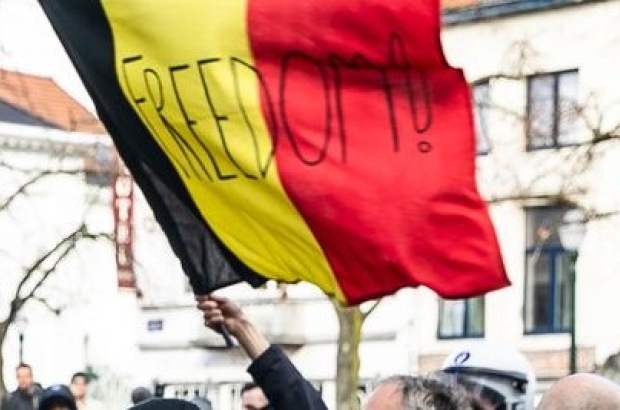- Daily & Weekly newsletters
- Buy & download The Bulletin
- Comment on our articles
Police arrest 30 protestors but major Freedom Convoy chaos avoided
Around 30 demonstrators from the so-called "freedom convoy" were arrested on Monday for disturbing public order and possession of prohibited weapons or dangerous objects, a police statement revealed. The majority of those detained were from Belgium and France.
The convoy, which originated in France, started arriving in Belgium in small groups during Sunday night and early Monday morning in a bid to stage a disruptive demonstration in the centre of Brussels against the coronavirus restrictions in Europe.
Police expected an inundation of vehicles with thousands thought to be heading across the Belgian border via various entry points in the early hours. In reality, only a few hundred made it into the country, most of whom were intercepted and diverted to the Parking C area on the Heysel plain outside the capital.
However, several hundred demonstrators responded to calls through the convoy’s communication channels and descended on foot to the European quarter and the city centre. About 200 protestors gathered around Place Sainte-Catherine and were soon surrounded by riot police who also secured the nearby metro station. There were no arrests at the scene and the protest remained non-violent.
Local police also confirmed that other small groups from the "freedom convoy" were roaming the city.
"We are keeping everything under control," said a spokesperson for the Brussels Capital Ixelles police zone around 15.00. "We are preventing the demonstrators from entering the centre even further. As long as they do not obstruct traffic and do not run amok, we will tolerate the current demonstration for a while."
The police also closed the Cinquantenaire Park and prevented demonstrators at the park from joining the protest at Place Sainte-Catherine. They used tear gas against some protesters. A section of Boulevard Lambermont was temporarily closed as a precaution. Another group of demonstrators also staged a small protest outside the RTBF headquarters on Boulevard Auguste Reyers.
Eventually about 30 people were arrested, mainly French and Belgians, for disturbing public order and possession of prohibited weapons or dangerous objects. Those arrested were in possession of, among other things, an axe and a machete.
As the day progressed the traffic situation around the city returned to normal and the filter blockades that had been set up in the morning were removed. The blockades had caused some minor disruption to the Monday morning rush hour, but the major disruption and gridlock caused by the convoy never materialised with more than 130 vehicles being diverted to Heysel.
Some of the protestors who had arrived during Sunday night set up an overnight camp at the Parking C site. By Monday morning, the majority of the vehicles had moved on, leaving only around a dozen cars, about 20 campers and one large truck.
"We left our village in central France on Friday morning,” said one protestor. “We went with some vehicles to Bourges, where the convoy was two to three kilometres long.”
“In Orléans there were two fields full of demonstrators, at least 100,000 people," claimed another. When asked where they had all gone, she replied: "Some came from the south of France. Once we were in Paris, some of them returned home tired."
Some said that they would not risk taking their cars into central Brussels as police issued warnings about impounding vehicles, but some revealed on Sunday night that they would join the protest planned for Monday in the city centre on foot.
Using various communications platforms such as the walkie-talkie app Zello to pass on information, there was some confusion as to where the protests would be staged with conflicting messages being passed around.
There was also a lack of consistency when it came to the targets of the protest. Some said they were there to protest high fuel prices while others, specifically within the French contingent, carried banners with slogans directed against the French president Emmanuel Macron. Most, of course, took issue with the coronavirus policies and restrictions.
"I haven't kissed my two grandchildren for two years because of the so-called vaccine," said one French protester. "I am against the vaccines, but also against the higher fuel prices. People on low incomes can't make ends meet anymore. They take us for sheep, but I'm a she-wolf."
"We want our freedom back,” said another. "I think we are ruled by a Satanist cult that wants to poison us with vaccines that we don't know what's in them. We are against Macron, but all world leaders are equal. They are puppets of big pharma.”
“We are afraid that a dictatorship will be installed," added another.
It was not only French conspiracy theorists who crossed the border. A number of Dutch license plates were among the vehicles parked at Heysel.
"At the border, we didn't notice anything from the police," said one protestor from Friesland who crossed into Belgium on Sunday night. "It went fine. Just before Brussels we were intercepted."
Even though The Netherlands isn't governed by Macron, according to the protestor and her husband, the political situation is similar to that in France. "We are constantly being lied to,” she said. “The figures are constantly being manipulated and have been for a year and a half."
The Dutch protestors didn’t share the opinions of some of those in Parking C who believed that the coronavirus was created in a laboratory to cause a global pandemic, but thought the health measures have gone too far. "Corona is a strange disease. People do die from it, but it's not nearly as bad as initially expected," said the husband. "These measures do not fit the situation we are in. I'm afraid they're burdening us with a digital passport that you'll be tied to for the rest of your life."


















